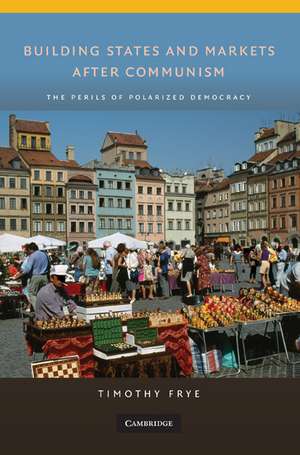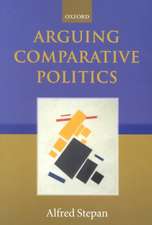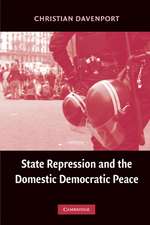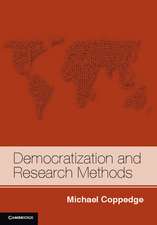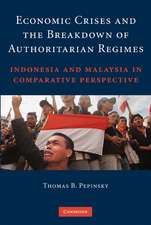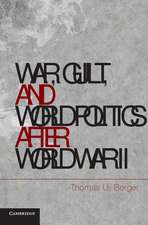Building States and Markets after Communism: The Perils of Polarized Democracy: Cambridge Studies in Comparative Politics
Autor Timothy Fryeen Limba Engleză Paperback – 6 iun 2010
Din seria Cambridge Studies in Comparative Politics
-
 Preț: 179.15 lei
Preț: 179.15 lei -
 Preț: 267.61 lei
Preț: 267.61 lei -
 Preț: 239.36 lei
Preț: 239.36 lei - 9%
 Preț: 594.67 lei
Preț: 594.67 lei -
 Preț: 160.82 lei
Preț: 160.82 lei -
 Preț: 269.58 lei
Preț: 269.58 lei -
 Preț: 264.74 lei
Preț: 264.74 lei -
 Preț: 177.28 lei
Preț: 177.28 lei -
 Preț: 225.70 lei
Preț: 225.70 lei -
 Preț: 164.94 lei
Preț: 164.94 lei -
 Preț: 236.42 lei
Preț: 236.42 lei -
 Preț: 185.64 lei
Preț: 185.64 lei -
 Preț: 233.13 lei
Preț: 233.13 lei -
 Preț: 206.71 lei
Preț: 206.71 lei -
 Preț: 231.82 lei
Preț: 231.82 lei -
 Preț: 206.52 lei
Preț: 206.52 lei -
 Preț: 201.24 lei
Preț: 201.24 lei -
 Preț: 358.37 lei
Preț: 358.37 lei -
 Preț: 203.42 lei
Preț: 203.42 lei -
 Preț: 232.45 lei
Preț: 232.45 lei -
 Preț: 257.82 lei
Preț: 257.82 lei -
 Preț: 191.12 lei
Preț: 191.12 lei -
 Preț: 158.77 lei
Preț: 158.77 lei -
 Preț: 199.05 lei
Preț: 199.05 lei - 11%
 Preț: 553.80 lei
Preț: 553.80 lei - 11%
 Preț: 695.06 lei
Preț: 695.06 lei -
 Preț: 288.80 lei
Preț: 288.80 lei -
 Preț: 262.06 lei
Preț: 262.06 lei - 11%
 Preț: 691.66 lei
Preț: 691.66 lei -
 Preț: 388.29 lei
Preț: 388.29 lei -
 Preț: 288.04 lei
Preț: 288.04 lei -
 Preț: 228.00 lei
Preț: 228.00 lei -
 Preț: 385.28 lei
Preț: 385.28 lei -
 Preț: 312.89 lei
Preț: 312.89 lei -
 Preț: 224.44 lei
Preț: 224.44 lei -
 Preț: 287.07 lei
Preț: 287.07 lei -
 Preț: 251.27 lei
Preț: 251.27 lei -
 Preț: 313.70 lei
Preț: 313.70 lei -
 Preț: 277.38 lei
Preț: 277.38 lei -
 Preț: 423.79 lei
Preț: 423.79 lei - 11%
 Preț: 552.94 lei
Preț: 552.94 lei - 11%
 Preț: 554.43 lei
Preț: 554.43 lei - 14%
 Preț: 783.26 lei
Preț: 783.26 lei
Preț: 238.72 lei
Nou
Puncte Express: 358
Preț estimativ în valută:
45.68€ • 47.91$ • 38.03£
45.68€ • 47.91$ • 38.03£
Carte tipărită la comandă
Livrare economică 01-15 aprilie
Preluare comenzi: 021 569.72.76
Specificații
ISBN-13: 9780521734622
ISBN-10: 0521734622
Pagini: 314
Ilustrații: 6 b/w illus. 44 tables
Dimensiuni: 155 x 231 x 15 mm
Greutate: 0.45 kg
Editura: Cambridge University Press
Colecția Cambridge University Press
Seria Cambridge Studies in Comparative Politics
Locul publicării:New York, United States
ISBN-10: 0521734622
Pagini: 314
Ilustrații: 6 b/w illus. 44 tables
Dimensiuni: 155 x 231 x 15 mm
Greutate: 0.45 kg
Editura: Cambridge University Press
Colecția Cambridge University Press
Seria Cambridge Studies in Comparative Politics
Locul publicării:New York, United States
Cuprins
Introduction; 1. The political logic of economic and institutional reform; 2. Political polarization and economic inequality; 3. The pace and consistency of reform; 4. Political polarization and economic growth; 5. Polarization and policy instability: the view from the firm; 6. Nationalism and endogenous polarization; 7. Russia: polarization, autocracy and inconsistent reform; 8. Bulgaria: polarization, democracy and inconsistent reform; 9. Poland: robust democracy and rapid reform; 10. Uzbekistan: autocracy and inconsistent gradualism; 11. Conclusion.
Recenzii
“From a leading scholar of post-communist political and economic development comes a new analysis that applies a familiar insight – economic reforms are less credible when political polarization is severe and policy reversal more likely – to a new and important problem: distinct patterns of economic reform and growth since the fall of Communism in the countries of Eastern Europe and Central Asia. Timothy Frye uses careful qualitative and quantitative analysis to chart the path from nationalism in the Soviet era to political polarization after Communism to policy reform and its (in)consistency to growth. By examining every link in a complex causal chain, he opens a black box that has often remained closed. His analysis, and the way he goes about it, make a signal contribution not only to the study of the region, but more generally to our understanding of the political economy of reform and development.”
– Philip Keefer, Lead Economist, Development Research Group, The World Bank
“Timothy Frye’s Building States and Markets after Communism is a superb addition to the growing literature on the political economy of post-communism. Frye develops a powerful and original model to explain the level of comprehensiveness and coherence of economic reform in 25 post-communist countries. Frye subjects his theory to a variety of empirical tests, using evidence from surveys of business people in the region, data on economic performance, and thorough case studies of Russia, Bulgaria, Poland and Uzbekistan. Written in a clear and accessible style, the book will stand as an authoritative analysis of the political and economic development of the post-communist region.”
– Thomas F. Remington, Emory University
“Frye’s account of the diverse fortunes of post-communist states distinguishes itself through attention to a critical intervening political mechanism: the greater or lesser partisan polarization around questions of economic reform that shapes the behavior of politicians, economic producers, and voters in the post-communist polity. Frye also explains how polarization comes about, is reproduced at the micro-level in the investment behavior of firms, and persists over time. Such quantitative analysis is complemented by meticulous case studies highlighting the empirics of centrifugal and centripetal political competition and its political-economic consequences. This carefully-crafted investigation will command the attention of anyone who plans to study the political economy of post-communism.”
– Herbert Kitschelt, Duke University
“Tim Frye’s book provides a major new perspective on the political economy of investment and growth in the countries of Eastern Europe and the former Soviet Union. His analysis of the effects of party system polarization pushes well beyond earlier theories of partial and inconsistent market reforms. His theoretical claims are built on an impressive combination of econometric analysis, original survey research, and new case studies. This ground-breaking study makes a significant contribution to our understanding of post-socialist countries and will be an important point of reference for analyses of economic reform in other parts of the developing world.”
– Robert Kaufman, Rutgers University
“Drawing on his deep knowledge of the post-communist experience, Tim Frye demonstrates that history can overwhelm attempts to get the institutions right. Conceptually bold and meticulously researched, Building States and Markets after Communism should be read by anybody who wants to understand the political economy of economic reform.”
– Scott Gehlbach, University of Wisconsin, Madison
– Philip Keefer, Lead Economist, Development Research Group, The World Bank
“Timothy Frye’s Building States and Markets after Communism is a superb addition to the growing literature on the political economy of post-communism. Frye develops a powerful and original model to explain the level of comprehensiveness and coherence of economic reform in 25 post-communist countries. Frye subjects his theory to a variety of empirical tests, using evidence from surveys of business people in the region, data on economic performance, and thorough case studies of Russia, Bulgaria, Poland and Uzbekistan. Written in a clear and accessible style, the book will stand as an authoritative analysis of the political and economic development of the post-communist region.”
– Thomas F. Remington, Emory University
“Frye’s account of the diverse fortunes of post-communist states distinguishes itself through attention to a critical intervening political mechanism: the greater or lesser partisan polarization around questions of economic reform that shapes the behavior of politicians, economic producers, and voters in the post-communist polity. Frye also explains how polarization comes about, is reproduced at the micro-level in the investment behavior of firms, and persists over time. Such quantitative analysis is complemented by meticulous case studies highlighting the empirics of centrifugal and centripetal political competition and its political-economic consequences. This carefully-crafted investigation will command the attention of anyone who plans to study the political economy of post-communism.”
– Herbert Kitschelt, Duke University
“Tim Frye’s book provides a major new perspective on the political economy of investment and growth in the countries of Eastern Europe and the former Soviet Union. His analysis of the effects of party system polarization pushes well beyond earlier theories of partial and inconsistent market reforms. His theoretical claims are built on an impressive combination of econometric analysis, original survey research, and new case studies. This ground-breaking study makes a significant contribution to our understanding of post-socialist countries and will be an important point of reference for analyses of economic reform in other parts of the developing world.”
– Robert Kaufman, Rutgers University
“Drawing on his deep knowledge of the post-communist experience, Tim Frye demonstrates that history can overwhelm attempts to get the institutions right. Conceptually bold and meticulously researched, Building States and Markets after Communism should be read by anybody who wants to understand the political economy of economic reform.”
– Scott Gehlbach, University of Wisconsin, Madison
Notă biografică
Descriere
This book examines how democracy influences state-building and market-building in 25 post-communist countries from 1990 to 2004.
